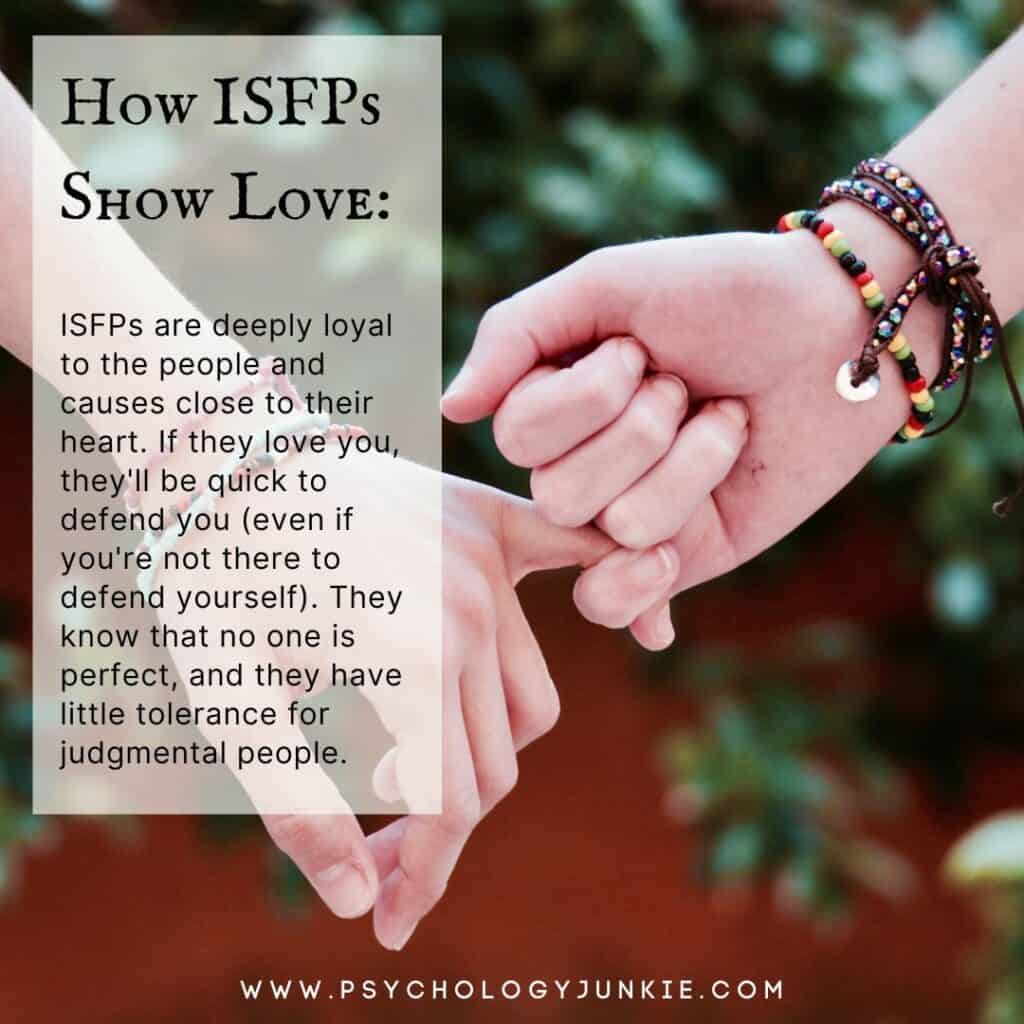How ISFPs Say “I Love You”
Have you ever wondered how ISFPs show love? Each of the 16 Myers-Briggs® personality types gives and receives loves in different and unique ways. If you’re partnered up with an ISFP and you find yourself confused because they show love differently than you do this article may help! Here we’re going to discover what ISFPs naturally do when they care about someone, and we’ll also take a look at some of the specific struggles they face in relationships.
Not sure what your personality type is? Try out our most highly recommended personality questionnaires:

- You can take our free personality questionnaire here
- You can take Personality Hacker’s highly accurate personality questionnaire.
- You can take the official Myers-Briggs Type Indicator® for $49.95
This article contains an affiliate link to a questionnaire on Personality Hacker. If you purchase one of their courses, I get a small kickback that I can use to pay for hosting and other demands of this site. I only recommend courses I love.
How ISFPs Show Love
They Allow You to Be You
ISFPs don’t believe in infringing on anyone else’s space or identity. Even if they disagree with you, chances are they’re not going to try to shove their worldview down your throat. If they care about you or love you, they will go out of their way to make sure you have an open space to express yourself. Unless you are violating a deep core value, they will try to give you opportunities to speak freely without cutting you off, interrupting, or making assumptions.
The most important thing is to be real with an ISFP. This doesn’t mean that you should lack propriety or say every rude thought that comes into your mind. It means being honest about what really matters to you on a core level and living with as little hypocrisy as possible. ISFPs tend to be skeptical of new people and can be suspicious if someone shows any signs of being phony or contrived.
“I empathize deeply with my partner and am willing to support him in difficult situations. Help is a form of open space to share, listen, and really understand what he is telling me, offering other perspectives and insights on how he can look at the problem. Because I really like to explore my inner self, I read various psychological, spiritual, and esoteric information and unravel and evaluate the insights that are across all that. I combine that research with my life experiences. I observe what is happening around me, why people react in such and such a way, what they probably feel, on the basis of which they do this and that, and what I am like. All this helps me and subsequently also my loved ones.” – Petra, an ISFP
They Try to Give You a Good Experience
ISFPs are one of the four “Adventurer” Myers-Briggs® personality types. Adventurers (SPs) enjoy living in the moment and have a hunger for rich experiences. As introverts, however, those experiences may be more subdued – like a hike in the mountains or listening to music at an intimate venue.
When an ISFP loves you, they’ll try to introduce you to some of the beautiful experiences just waiting to be had. They especially love giving you an experience you’ve never had before.
They Try to Help You in Practical Ways
As Sensors, ISFPs know that actions speak louder than words. If they care about you they’ll try to make your life easier in some practical way. Some help with housework, others hate housework and will help drive you somewhere you need to go or teach you a skill that can help with in some way – whether that’s learning an instrument, a language, or a creative ability.
“As an ISFP when it comes to love, I show it by “doing” for my significant other and being always appreciative of them. Meaning I show love by making their life easier in any way possible. Even the smallest of gestures like when they’re too busy to get themselves lunch, I’ve thought ahead and gotten them lunch.” – Thevendran Govender, an ISFP
They Listen Intently
ISFPs are excellent at listening and they are adept at noticing physical cues that can give further insight into how you’re feeling. When you’re talking to them, they try to be as present and attentive as possible. They won’t interrupt you or offer unsolicited advice unless you ask for it. Even then, they’ll be careful to sensitively address your feelings while being honest.
“I listen not to have a response but to understand where someone is coming from and to have a better idea of exactly how they are feeling. I show love by putting my phone down when someone is talking so that they know I am paying attention to them and to show that I care.” – Cody, an ISFP
Dario Nardi, a neuroscience expert and former professor at UCLA, said of ISFPs:
“The Fi types (ISFPs and INFPs) often enter a special listening mode. They are consummate listeners. They thoroughly engage all brain regions that process voice, words, and sounds; moreover, they may easily enter a unique whole-brain state when listening to other people, whoever those people might be.” – Dario Nardi, Neuroscience of Personality
They Give Meaningful Gifts
Many ISFPs like to show love in physical ways – via something tangible. As sensors, they realize the significance and meaning that can lie behind physical things. This means that if they give you a gift, it will be something they put thought into. It may be hand-crafted, or have some other personal meaning to them or to the both of you.
They Try to Figure You Out
If an ISFP isn’t interested in you as a person they will stick to themselves and avoid asking a lot of questions. But if an ISFP cares about you, they ask questions and try to understand what you’re all about. It’s especially important for them to know what matters to you on a core level – what drives your heart and soul. They may send you personality quizzes to take, ask questions, or notice the things that you get passionate about. Even if they’re not interested in a particular interest of yours, they’ll humor you because they know it’s something that makes you happy and gives them insight into your character.
“I show love by being interested in the other person, whether they are doing well. I can leave him room for needs and interests that are not related to me. I show love by mastering activities that my partner just can’t master, because he does for me what I don’t like to do.” – Petra, an ISFP
They Defend You to Others
ISFPs are deeply loyal to the people and causes close to their heart. If they love you, they’ll be quick to defend you (even if you’re not there to defend yourself). They know that no one is perfect, and they have little tolerance for judgmental people. So, if they see someone being critical of you, they’ll step in and try to set the record straight.
“I tend to be very vocal about people I care for, especially if I feel like somebody is judging them too harshly. I will always have their back and be their number one supporter.” – Laura, an ISFP
They’ll Respect Your Space
ISFPs are sensitive individuals who need a lot of time alone to process their own feelings and thoughts. This means that they’ll honor that need for you as well. When ISFPs care about you, they’ll respect your need for space and won’t crowd you or try to control you. They have a strong need for this in a partner as well.
Common Hardships of ISFPs in Relationships:
David Keirsey, one of the forefathers of typology research, stated that ISFPs are “probably the most misunderstood of all the types.” (Please Understand Me II, pg. 204)
While on the outside ISFPs can seem reserved and mysterious, they have a deep well of feeling and sensitivity on the inside. People often misunderstand them and believe them to be more detached than they really are. They may unknowingly hurt the ISFP’s feelings, underestimate them, or believe their feelings to be less deep than they really are.
“A major source of misunderstanding is the tendency of ISFPs not to express themselves directly, but through action. If they find a medium of expression, some art form, then the character is expressed in some degree via the medium. If not, it simply doesn’t come out, and no one knows them, this social reticence making the character all but invisible.” – David Keirsey, Please Understand Me II
ISFPs have a wealth of rich personality traits under the surface; a kaleidoscope of diverse feelings, tastes, and perspectives. But on the outside they often appear more aloof than they actually are. It can be difficult for them to verbalize their feelings, and many ISFPs admit to feeling “cringey” if they do. Therefore, in romantic relationships they hope their action-oriented gestures are seen for the devotion that lies behind them. Yet some partners underestimate their love and don’t see the genuine feeling of love behind the ISFP’s gestures. They demand and crave more verbal expression, more whispers of “sweet nothings” to be satisfied – ignoring the ISFP’s other ways of showing love.
“Honestly, I don’t verbally express my love much; it makes me cringe. So I tried to deliver love to my loved ones by other methods like helping them with tasks, or simply conversing with them.” – Nasuha, an ISFP
Some ISFPs are more comfortable with verbal demonstrations than others; but as Introverted Feeling types (FPs) they are more likely to feel things richly on the inside while appearing more calm on the outside. Having a creative medium to express their feelings is a great way to see their deeper inner world. Ask to listen to their favorite songs, look at their crafts, artwork, or other projects and passions. Watch their favorite movies and ask them what they love about them! Often ISFPs are more comfortable expressing their feelings in a more indirect way such as this.
ISFPs and Being Present:
Like most Adventurers (SP types), ISFPs enjoy relishing the moment and finding all the beauty and possibility in it. ISFPs crave a partner who can be present with them; without comparing to-do lists, making plans, or complaining about something from the past. This doesn’t mean they never want to plan or commiserate, but it’s important for partners to realize when ISFPs are “in the moment” and craving that kind of presence with their partner.
Some Tips For Being Present:
- Put away your phone and give ISFPs your undivided attention. Listen with your ears, eyes, and heart. – When they’re talking to you, don’t think about what you’re going to say next; just listen.
- Don’t say “well, if I were you” when they’re explaining a struggle with you. This is the ISFP’s problem, not yours. Just listen and try to understand without trying to fix it. Be patient when they’re processing out loud. It can be helpful to ask clarifying questions or rephrase what you’re hearing back to them to make sure you understand it right. If you have some good advice to offer, ask them if they’re open to it first and try not to be condescending.
- Don’t rush them through their creative process. ISFPs often enjoy taking their time with creative tasks. They savor the process as much as (if not more than) the finished product.
- Take time for yourself – especially if you’re an introvert. If you’re overwhelmed by worries, tasks and obligations, it can feel extremely difficult to be present with your partner when you’re alone with them. Make sure you’re getting enough alone time for yourself so that when you have some time with the ISFP, you can actually tune into each other’s needs more fully. This is especially true for introverts as well as TJ types.
- Notice the little things they say and do and try to see the love behind them and acknowledge it. They may not blurt out loving words all the time, but if you look you can see their love in other ways. It may be through small acts of physical affection, through listening attentively when you’re speaking and asking questions, or through some practical effort to ease your load.
- Show gratitude for the things they do.
ISFPs and Commitment
As Perceivers, ISFPs crave freedom and autonomy. One struggle they often face in a relationship is someone wanting to pressure them to make commitments or plans before they are ready. Or, if they are already married, they may feel like all their time is scheduled for them.
It’s important to note that an ISFP’s hesitancy to commit doesn’t mean they aren’t deeply devoted to their partner. They just naturally tend to feel anxious when it feels like someone is trying to control or box them in. When they start feeling trapped or controlled they can shut down and become even more hard-to-read. This is typically not done in a passive-aggressive way. They’re not trying to make you feel bad through some kind of “silent treatment”. Instead, they are trying to create some mental space so they can sort out their thoughts or avoid feeling overwhelmed or trapped by you.
It’s crucial for ISFPs to feel like they can “go with the flow” in a relationship and that they aren’t being forced into someone else’s fantasy timeline. ISFPs like having lots of time to absorb information about their partner, see how experiences unfold, and scope out their level of trust and comfort. If they are pursuing something like marriage, they want to make sure they’re choosing the best result possible and not just being impulsive. Pressing an ISFP to decide too quickly can make them highly stressed, and you’ll notice their body language become more rigid and their demeanor become more quiet and closed off.
How to Respect an ISFP’s Need for Space and Freedom:
- If it’s honest, let them know that you’re not going anywhere and that they can take all the time they need to make a decision. Avoid ultimatums and giving them an expiration date on making a decision. This will only add extra pressure and stress.
- Relax yourself and try to be present with them rather than fast-forwarding to a future you want to “achieve.”
- Give them space every day to quietly pursue their own independent interests. Whether this is watching television, painting, reading, or listening to music, this quiet time is essential.
- Be friendly and sincere with them, but try not to overwhelm them with emotional demands. Always avoid being passive-aggressive. An ISFP will appreciate a direct but kind critique much more than anything manipulative.
- Don’t get annoyed if they take time to answer your text or phone call. They need time to formulate their responses and get to a good mental space before they respond.
- Try not to make plans for them. You can give suggestions or pose options, but they don’t like feeling like they’re being roped into someone else’s schedule.
- If you do have a need or something you need to schedule, try to be direct but kind about it. Saying “I could use a break, would you mind watching the kids for an hour?” rather than stating a demand like “It’s your turn to watch the kids. I’ll be back in an hour” will work better. And always avoid the passive-aggressive approach like “I could really use a break, I wish somebody could watch the kids for me.”
What Are Your Thoughts?
Did you enjoy this article? Do you have any suggestions, stories, or insights to share from your own life? Let us and other readers know in the comments!
Find out much more about your personality type in our eBooks, Discovering You: Unlocking the Power of Personality Type, The INFJ – Understanding the Mystic, The INTJ – Understanding the Strategist, and The INFP – Understanding the Dreamer. You can also connect with me via Facebook, Instagram, or Twitter!
Other Articles You Might Enjoy:
24 Signs That You’re an ISFP, the Virtuoso Personality Type
10 Things You Should Never Say to an ISFP
10 Things That Excite the ISFP Personality Type
Subscribe to Our Newsletter

Want to discover more about personality type? Get the inside scoop with Susan Storm on all things typological, along with special subscriber freebies, and discounts on new eBooks and courses! Join our newsletter today!















Thanks for this article. It is me. I am so gratified that there are others who struggle with the same things. I need that alone time and beautiful experiences in nature and through music. So many things were touched on in this article. Amazing!
Thank you! I loved seeing this article, especially when content for sensor types is harder to find, but especially for ISFP types (I am not a sensor type myself, but I love to read about them because I believe it’s crucial to get a more accurate picture about the whole system)
I like this series of articles !! would like to read ENFP!